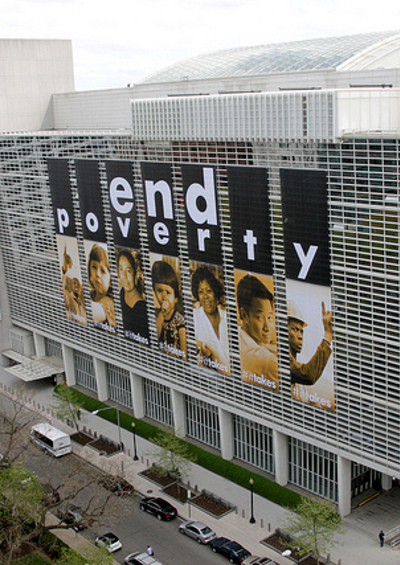Paul Romer: Back to a U.S.-Dominated World Bank?
Choosing Romer as World Bank chief economist attempts to restore past U.S. dominance in development banking.
July 23, 2016

The appointment of Paul M. Romer of New York University as the new World Bank’s chief economist was widely was greeted with overwhelming enthusiasm, especially by academic peers.
The 60-year old economist – mostly known for his seminal contribution to the so-called endogenous growth theory and as a defender of special economic zones (“Charter Cities“) — will be the next chief economist of the World Bank.
At the World Bank, the selection of the chief economist is always also a vital signal as to the next area of focus for the institution.
With Romer, the bank can strengthen its profile as knowledge bank, a goal it has long embraced, but with which it has never quite succeeded so far.
This focus should help differentiate the Washington-based institution in the world of development banking.
Paul Romer enriched growth theory by “endogenizing” ideas and know how, rather than treating human capital as an exogenous residual factor – as an afterthought of economic reasoning and analysis.
His pioneering work makes the case that open economies grow faster in the longer run if they foster institutions as well as a social model that help create and disseminate know how.
Charter City hype
From there, Romer eventually proceeded to the much-hyped idea of “Charter Cities.” Those are newly created cities – almost straight out of the lab – and located in poor countries.
The basic underlying idea is that urban agglomerations tend to facilitate the generation and dissemination of ideas.
Romer’s “Charter Cities” are supposed to foster development within poor countries via the creation of new special zones that are free from corruption and where property rights are respected.
Europe has known what Romer discovered and re-packaged already since the Middle Ages: Stadtluft macht frei (“moving to the city is liberating”). Serfs could flee the feudal lands and gain freedom this way.
That made cities a territory outside the feudal system to a certain extent, similar to how “Charter Cities” are conceptualized today.
Charter Cities and neo-colonialism
The developmental role of “Charter Cities” is derived from the experiences of the former British crown colony Hong Kong and the Chinese special economic zone of Shenzhen.
The basic problem with the underlying idea is not only the historical origin of Romer’s concept has a neo-colonial smell. It is also the fact that the poor-country government essentially has to give up control to foreign investors.
Honduras tried the concept in 2011 by modifying the constitution to allow judiciary, police, economics and finance to be removed from central government in new “special development zones.”
Critics have pointed to Honduras’ past as a “banana republic” under U.S. corporate dominance.
Rather than becoming prosperous development poles, special zones or model cities can easily turn into heavens for tax evasion, money laundering, corruption and sweatshops, as the Swiss newspaper Neue Zürcher Zeitung warned already in 2012.
Back to the future: Americans only?
The real drawback in Romer’s selection is that the World Bank reverses the newly-established tradition to select the chief economist from an emerging market country.
The former and the current (soon to be outgoing) chief economists, Justin Yifu Lin and Kaushik Basu, the World Bank brought the Chinese and Indian development economists to Washington, D.C.
To my knowledge, Professor Lin was the first chief economist at the bank who did not come from a North American university.
The nomination of Lin especially had reflected the recalibration of the world toward the East. It did so not just in an economic or political sense, but also in a paradigmatic fashion.
I venture the hypothesis that the choice of a U.S. economist to lead the economics team at the World Bank can be explained by multilateral fragmentation.
It reflects the fact that the U.S. government could not prevent establishment of the AIIB, China’s successful attempt to exit the U.S.-led multilateral banking system.
Given how capital-rich China has become, it is hard for the United States to compete with China on the basis of funding alone. However, the World Bank may counter the decline in its relative importance in the global institutional and funding firmament on the basis of know how.
Whatever the official effusive rhetoric, the choice of Romer may indicate an attempt to help restore the old world of paradigmatic U.S. dominance in development banking.
Takeaways
At the World Bank, the selection of chief economist is a vital signal to the next focus area for the institution.
With Romer, the bank can strengthen its profile as knowledge bank, a goal it has long embraced.
The choice of Romer indicates an attempt to restore the old world of U.S. dominance in development banking.
By picking Romer, the World Bank ends a tradition of bringing on an emerging market economist.
Read previous
Global Autocracy
Turkey’s Elected Dictator
July 22, 2016
